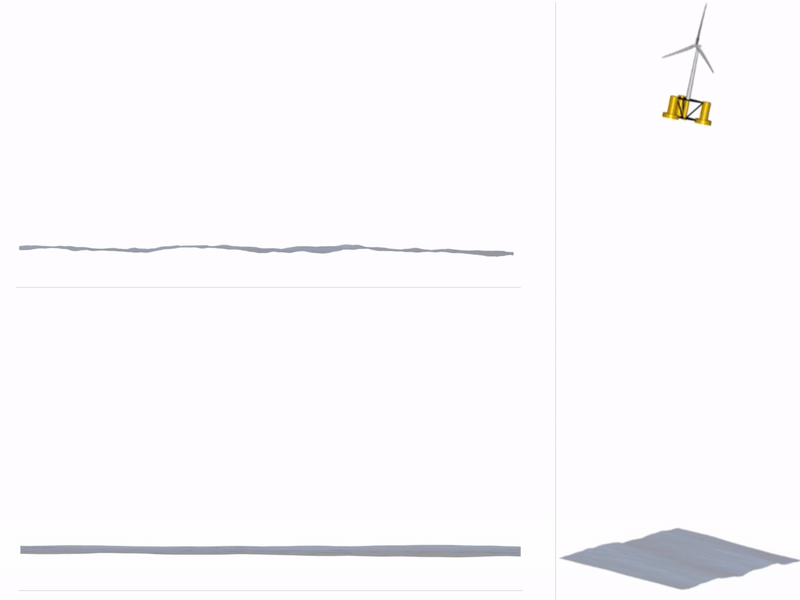Forum
Important Notice for New User Registrations
To combat an increasing number of spam and bot registrations, we now manually approve all new user registrations. While this may cause a delay until your account is approved, this step is essential to ensure the quality and security of this forum.
To help us verify your registration as legitimate, please use a clear name as user name or an official email address (such as a work, university, or similar address). If you’re concerned that we may not recognize your registration as non-spam, feel free to email us at with a request to approve your username.
Reproduce the OC4 ME Regular Wave results in Documentation
Quote from zhexinlyu on 17. June 2023, 18:51Hi everyone,
First, I’d like to thank David for his previous help (Output from Substructure file), which has greatly aided my research.
I am currently attempting to reproduce the hydrodynamic results derived from the part Validation Tests for Morison Equation (ME) — QBlade Documentation 2.0.4 documentation in Documentary. My focus is primarily on the outcome shown in Figure 161, specifically for a regular sea state H = 6m, T = 10s. Initially, I successfully reproduced the hydrodynamic results from the OC4 model (Potential Flow Models with Morison Drag), as documented. But for the application of Morison Equation only, I encountered difficulties. Below, I’ve detailed the changes I’ve made to the parameters within the OC4 model substructure file ‘OC4_DeepCWindSemi_Sub_LPMD.str’ according to Validation Tests for Morison Equation (ME) — QBlade Documentation 2.0.4 documentation. Despite numerous attempts, I’ve been unable to identify the issue and I hope that someone can help to find where I might have gone wrong.
- Deactivated potential flow: set variables such as USE_RADIATION, USE_EXCITATION, etc., to ‘false’ (as seen in Figure 1).
- Active Morison Equation: added the other hydrodynamic coefficients (add-mass and dynamic pressure coefficient) for the OC4 ME model, which were taken from the OC4 Report 1 with additional coefficients taken from 2 (Figure 2)
Unfortunately, the results (represented by the black curve in Figure 3) did not meet expectations. It should have been close to the red curve, which is the result from LPMD OC4 model.
If needed, I would be glad to send my Substructure file via email for a more convenient review. As a newcomer to Hydrodynamics, I would appreciate any help or suggestions. Thank you in advance for your guidance.
Best regards,
Zhexin Lyu
Hi everyone,
First, I’d like to thank David for his previous help (Output from Substructure file), which has greatly aided my research.
I am currently attempting to reproduce the hydrodynamic results derived from the part Validation Tests for Morison Equation (ME) — QBlade Documentation 2.0.4 documentation in Documentary. My focus is primarily on the outcome shown in Figure 161, specifically for a regular sea state H = 6m, T = 10s. Initially, I successfully reproduced the hydrodynamic results from the OC4 model (Potential Flow Models with Morison Drag), as documented. But for the application of Morison Equation only, I encountered difficulties. Below, I’ve detailed the changes I’ve made to the parameters within the OC4 model substructure file ‘OC4_DeepCWindSemi_Sub_LPMD.str’ according to Validation Tests for Morison Equation (ME) — QBlade Documentation 2.0.4 documentation. Despite numerous attempts, I’ve been unable to identify the issue and I hope that someone can help to find where I might have gone wrong.
- Deactivated potential flow: set variables such as USE_RADIATION, USE_EXCITATION, etc., to ‘false’ (as seen in Figure 1).
- Active Morison Equation: added the other hydrodynamic coefficients (add-mass and dynamic pressure coefficient) for the OC4 ME model, which were taken from the OC4 Report 1 with additional coefficients taken from 2 (Figure 2)
Unfortunately, the results (represented by the black curve in Figure 3) did not meet expectations. It should have been close to the red curve, which is the result from LPMD OC4 model.
If needed, I would be glad to send my Substructure file via email for a more convenient review. As a newcomer to Hydrodynamics, I would appreciate any help or suggestions. Thank you in advance for your guidance.
Best regards,
Zhexin Lyu
Uploaded files:
- You need to login to have access to uploads.
Quote from David on 19. June 2023, 11:55Hi Zhexin,
as mentioned before the model that we have used for the flexible substructure demonstration in the documentation has not been thooughly validated yet. So you can expect this model to behave slightly different from the “validated” potential flow based substructure model. It can be quite tricky to tune all the Morisson coefficients correctly so that the behavior is in-line with that of a potential flow based model.
For reference I have attached the substructure file that we have used to generate the data presented in the documentation – but again, this is not a fully validated model and can possibly be improved.
BR,
David
Hi Zhexin,
as mentioned before the model that we have used for the flexible substructure demonstration in the documentation has not been thooughly validated yet. So you can expect this model to behave slightly different from the “validated” potential flow based substructure model. It can be quite tricky to tune all the Morisson coefficients correctly so that the behavior is in-line with that of a potential flow based model.
For reference I have attached the substructure file that we have used to generate the data presented in the documentation – but again, this is not a fully validated model and can possibly be improved.
BR,
David
Uploaded files:- You need to login to have access to uploads.


